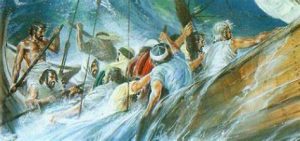Daily Bible Readings:
Monday, January 18. Read Genesis 12:1-3. 1) What did God tell Abraham to do? 2) What was God going to do through Abraham?
Tuesday, January 19. Read Isaiah 42:5-7. 1) What does God say about God’s self? 2) What did God say he wanted his servant to do?
Wednesday, January 20. Read Nahum 1:1-3; 2:8-12. 1) Who was the object of Nahum’s prophecy? 2) What does God say about God’s self? 3) What does God say about his adversaries? Look at 2:10-12. What will happen to Nineveh?
Thursday, January 21. Read 2 Kings 14:23-27. 1) What did Jereboam do during his reign? 2) What did God do for Israel? 3) What role did Jonah play in this?
Friday, January 22. Read 1 Kings 19:3-4, 9-11. 1) What did Elijah feel when he found out what Jezebel was going to do to him? 2) What did Elijah do when he learned this? 3) Look at 19:10. What kind of relationship did Elijah have with God?
Saturday, January 23. Read Jonah 3:1-5,10. This is Sunday’s sermon text.
Prayer for the Week:
O God, how stubborn we are at times. Refusing to do what we know you want us to do. Sometimes our decision polluted by anger, resentment, and revenge. But we ask you to let us learn from Jonah. May we desire his humility, honesty, and submission at all times. May we never prefer the shade of bush rather than dwelling in your will. In Jesus’ name I pray this. Amen.
Poem of the Week:
(This week a poem rather than a hymn is featured.)
Jonah
Robert Graves London / England
A purple whale
Proudly sweeps his tail
Towards Nineveh;
Glassy green
Surges between
A mile of roaring sea.
“O town of gold,
Of splendor multifold,
Lucre and lust,
Leviathan’s eye
Can surely spy
Thy doom of death and dust.”
On curving sands
Vengeful Jonah stands.
“Yet forty days,
Then down, down,
Tumbles the town
In flaming ruin ablaze.”
With swift lament
Those Ninevites repent.
They cry in tears,
“Our hearts fail!”
The whale, the whale!
Our sins prick us like spears.”
Jonah is vexed;
He cries, “What next? what next?”
And shakes his fist.
“Stupid city,
The shame, the pity,
The glorious crash I’ve missed.”
Away goes Jonah grumbling,
Murmuring and mumbling;
Off plows the purple whale,
With disappointed tail.
Devotional Articles of the Week.
Jonah and Nineveh
What happened to Jonah AFTER he got out of the fish
by Bill Brant
His story is recorded in Hebrew, Christian and Islamic literature. All three religions consider him a prophet of God Almighty. He is remembered for the fish story more than his persuasiveness to the citizens of a city.
His story is told in the book of Jonah.
The word of the Lord came to Jonah the son of Amittai saying, “Arise, go to Nineveh the great city and cry against it, for their wickedness has come up before Me” (Jonah 1:1-2).
And though the three days in the fish has become the most remembered of his exploits, it is his work in Nineveh that has elevated his stature. Nineveh was located on the east side of the Tigris River in Assyria and was one of the greatest cities of Mesopotamia. It was here that Jonah preached God’s message: Yet forty days and Nineveh shall be overthrown (Jonah 3:4). And the people and their king believed God.
Then God saw their works; that they turned from their evil way; and God relented from the disaster that He had said He would bring upon them, and He did not do it(Jonah 3:10).
The book of Jonah leaves the glum prophet outside the city, but secular history notes that Jonah remained in Nineveh for the remainder of his life. He is said to have become the Spiritual leader to the citizens there. And when he died, the people built his burial tomb so he could always watch over the city he helped save. Over the centuries the tomb became a complex of buildings visited by pilgrims of all faiths.
On the west bank of the Tigris another city grew, eventually jumping across the river and encompassing the old city of Nineveh. The new city is now Mosul in the country of Iraq.
This past July, the militant group ISIS destroyed Jonah’s tomb because according to them it had become a “place of apostasy.”
Jonah is not remembered for his birthplace and burial tomb, but because he finally did what God directed him to do. And the people he talked to responded to God’s call.

